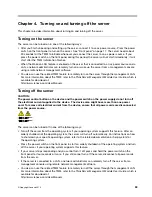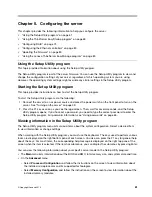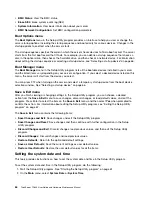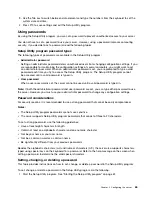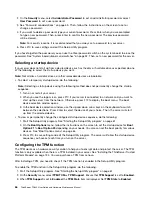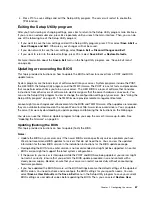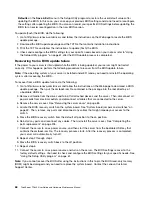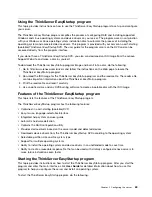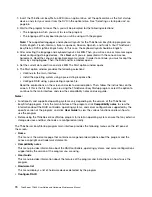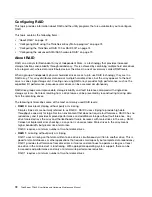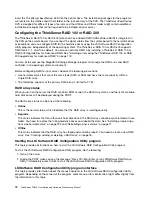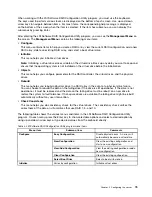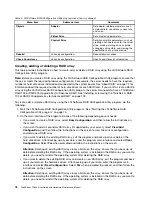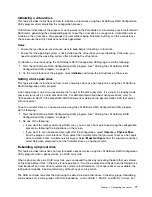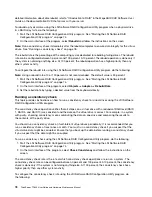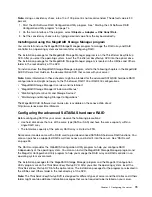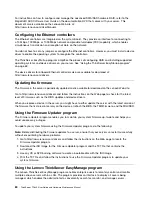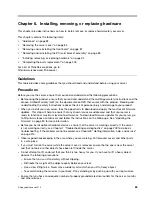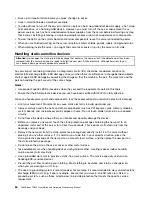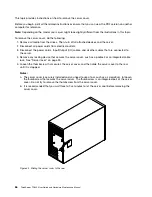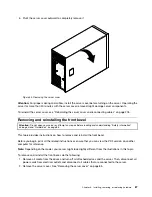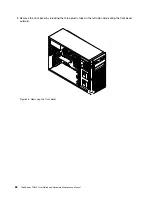
•
RAID 5
: block-level striping with distributed parity
RAID 5 uses disk striping and parity data across all drives (distributed parity) to provide high data
throughput, especially for small random access. RAID 5 distributes parity along with the data and requires
all drives but one to be present to operate; drive failure requires replacement, but the array is not
destroyed by a single drive failure. Upon drive failure, any subsequent read operations can be calculated
from the distributed parity so that the drive failure is masked from the end user. The array will have data
loss in the event of a second drive failure and is vulnerable until the data that was on the failing drive is
rebuilt onto a replacement drive. A single drive failure in the set will result in reduced performance of
the entire set until the failing drive has been replaced and rebuilt.
RAID 5 requires a minimum number of three hard disk drives.
•
RAID 10
: a combination of RAID 0 and RAID 1
RAID 10 consists of striped data across mirrored spans. A RAID 10 drive group is a spanned drive
group that creates a striped set from a series of mirrored drives. RAID 10 allows a maximum of eight
spans. You must use an even number of drives in each RAID virtual drive in the span. The RAID 1
virtual drives must have the same stripe size. RAID 10 provides high data throughput and complete data
redundancy but uses a larger number of spans.
RAID 10 requires a minimum number of four hard disk drives and also requires an even number of drives,
for example, six hard disk drives or eight hard disk drives.
•
RAID 50
: a combination of RAID 0 and RAID 5
RAID 50 uses distributed parity and disk striping. A RAID 50 drive group is a spanned drive group in
which data is striped across multiple RAID 5 drive groups. RAID 50 works best with data that requires
high reliability, high request rates, high data transfers, and medium-to-large capacity.
Note:
Having virtual drives of different RAID levels, such as RAID 0 and RAID 5, in the same drive group is
not allowed. For example, if an existing RAID 5 virtual drive is created out of partial space in an array, the
next virtual drive in the array has to be RAID 5 only.
RAID 50 requires a minimum number of six hard disk drives.
For detailed information about RAID, refer to “Introduction to RAID” in the
MegaRAID SAS Software User
Guide
on the documentation DVD that comes with your server.
Configuring RAID using the ThinkServer EasyStartup program
The ThinkServer EasyStartup program simplifies the process of configuring supported RAID and installing
supported Windows and Linux operating systems and device drivers on your server. The user guide for the
program can be accessed directly from the program interface.
The ThinkServer EasyStartup program has the following features for RAID configuration:
• For use with all supported RAID controllers
• Automatically detects hardware and lists all supported RAID configurations
• Configures one or more disk arrays per controller depending on the number of drives attached to the
controller and the RAID level selected
• Supports hot-spare drives
• Creates a RAID response file that can be used to configure RAID controllers on similarly configured
Lenovo servers
See “Using the ThinkServer EasyStartup program” on page 69 and view the user guide from the main
interface of the program.
Some RAID management software also is provided on the
ThinkServer EasyStartup
DVD to help you manage
RAID arrays and RAID controllers in an operating system environment. After you enter the operating system,
Chapter 5
.
Configuring the server
73
Summary of Contents for 70B4
Page 16: ...4 ThinkServer TD340 User Guide and Hardware Maintenance Manual ...
Page 18: ...6 ThinkServer TD340 User Guide and Hardware Maintenance Manual ...
Page 94: ...82 ThinkServer TD340 User Guide and Hardware Maintenance Manual ...
Page 220: ...208 ThinkServer TD340 User Guide and Hardware Maintenance Manual ...
Page 230: ...218 ThinkServer TD340 User Guide and Hardware Maintenance Manual ...
Page 244: ...232 ThinkServer TD340 User Guide and Hardware Maintenance Manual ...
Page 245: ......
Page 246: ......

